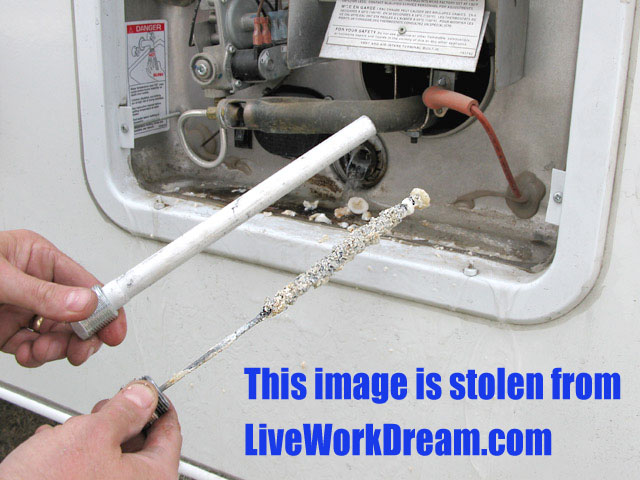You know all those appliance manuals that came with you RV? Dig them out from under the bed and read them, at least once a year. It will remind you of certain things you need to maintain to keep your rig in prime operating condition.
Take for instance the water heater. It has an easily accessible anode rod that should be replaced at least annually. All RV water heaters are protected by this magnesium or aluminum anode to prolong the life of the tank by absorbing the corrosive action of hot water. Basically, it will corrode before the tank does. And if it corrodes entirely, it can no longer do its job.
This is just one of those little things we forgot all about. And we are not alone. But it is also one of the most simple items on the honey-do list of any RVer. Just make sure the hot water has been turned off for a while or you may get scalded, and that your hose is disconnected so the system is not pressurized.
Then release any pressure in the water heater tank by pulling its relief valve. Now get yourself a deep socket ? the rod in our Suburban water heater has 1 1/16″ head ? and loosen the threaded anode rod at the bottom of the water heater. (Yes, from outside your rig.) Let all the water drain and flush out any debris with a hose. this took me a while because we had accumulated quite a bit of debris as you can see by how our old anode looked.
Replacement anode rods can be found at any RV parts counter or service center. To prevent leakage, apply teflon tape to the threads before screwing in the new anode. Make sure it is screwed in straight and secure, fill the tank, run a faucet to allow any trapped air to escape, turn on the heater, and you’re set for another few months. Or at least until you remember you forgot all about the water heater anode again.

will a bad anode rod cause the hot water tank to stop heating. I am using the electric mode on my tank.
It could…if corrosion was so bad it caused the element to fail. Check out my post: How to Troubleshoot & Fix RV Water Heater Electrical Problem
OK. I got the 1 1/16″ nut off but the anode rod didn’t come with it. Now what? Bearing puller? PB Blaster and a good hard pull?
If you’re saying the nut broke off and the threads are still in the socket, I would try using an Easy Out. If the threads are free and the anode is just missing, it may have corroded completely and flushing the heater many times may remove all the residue.
Thanks for asking! Maybe someone else will have better ideas.
The “nut” is threaded inside and out. It came off after some persuasion with PB Blaster and left the anode rod inside the heater. It appears that a very small rod was attached to the inside of the nut and sheared off. Pictures of the anode rod shows it attached to the nut. The threads on the part still in the heater don’t appear to match the threads on the inside of the nut. When I thread the nut back onto them, the nut is loose and wobbles around.
Interesting. I’ve never had that issue, good luck figuring that one out!
If you’re saying the nut broke off and the threads are still in the socket, I would try using an Easy Out. If the th
Aluminum or Magnesium anode rod, does it matter which I I use? and where can I find it out if it does if I don’t have a manual for the heater. I have a used trailer and just winterized it and drained the heater, I saw that I will need to put in a new rod when the season starts up, but I’m unsure which I will have to use and I don’t have the user manual.
Thanx in advance for your help
From what I know and have read, it shouldn’t matter. I just used the only kind they had at the RV shop.
Why do water heaters (that don’t require anode rods, believe they are aluminum) have plastic plugs? I am continually replacing these. Can I use a copper plug?
Good question! I have no idea. Sorry, but I suggest you ask at your local RV dealer or service shop. I’m no technician.
My travel trailer sits idle on site all winter so I drain all water and use the bypass so anti-freeze doesn’t get into hot tank. What is best for the anode rod opening from the outside for the winter? Plastic plug or what?
Good question! If there’s no water in the heater, there’s no reason you couldn’t just leave the anode rod in there. Otherwise, a plastic plug should be just fine. Or, cut the anode off next time you change it and just use the plug end. Thanks for asking.
Thank you so much for sharing this great tip! We definitely will check ours soon.
So how old was that anode rod???
About 21 months. Thanks for asking.